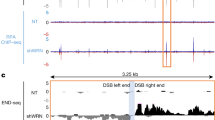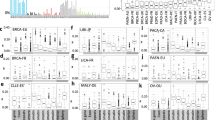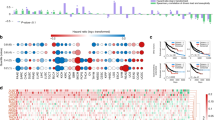Abstract
Microsatellite instability occurs in 15% of colorectal carcinomas and may be due to replication errors (RER). The pattern of instability–`severe' vs `mild'–and the tumorigenic pathway, as reflected by the involvement of functionally important genes, may vary according to the underlying gene(s). We defined `mild' RER as mono- or tetranucleotide repeat instability in the absence of widespread instability at dinucleotide repeats and studied 15 colorectal tumors with this phenotype for mutations in the DNA mismatch repair genes MSH2, MLH1, MSH3, and MSH6. No mutations were found, suggesting that these genes were not implicated. We then compared colorectal cancers with `mild' RER (n=15), and those with `severe' RER without (n=11) or with (n=22) detectable mutations in MSH2 or MLH1 to assess the involvement of mononucleotide repeats contained in the coding regions of MSH3, MSH6, BAX, and TGFβ RII. The combined mutation rates of the above mentioned loci varied significantly between the three groups of tumors, being 0%, 25% and 52%, respectively. Furthermore, the individual genes showed specific patterns of involvement; for example, among tumors with `severe' RER, TGFβ RII displayed uniformly high mutation rates while MSH3, MSH6, and BAX were more frequently altered in tumors that also showed MSH2 or MLH1 mutations. Our findings suggest that different subcategories exist among unstable tumors, defined by the RER pattern on the one hand and tumorigenic pathway on the other, and structural changes of MSH2 and MLH1 are likely to explain only a proportion of these cases.
This is a preview of subscription content, access via your institution
Access options
Subscribe to this journal
Receive 50 print issues and online access
$259.00 per year
only $5.18 per issue
Buy this article
- Purchase on Springer Link
- Instant access to full article PDF
Prices may be subject to local taxes which are calculated during checkout
Similar content being viewed by others
Author information
Authors and Affiliations
Rights and permissions
About this article
Cite this article
Percesepe, A., Kristo, P., Aaltonen, L. et al. Mismatch repair genes and mononucleotide tracts as mutation targets in colorectal tumors with different degrees of microsatellite instability. Oncogene 17, 157–163 (1998). https://doi.org/10.1038/sj.onc.1201944
Received:
Revised:
Accepted:
Published:
Issue Date:
DOI: https://doi.org/10.1038/sj.onc.1201944
Keywords
This article is cited by
-
Milestones of Lynch syndrome: 1895–2015
Nature Reviews Cancer (2015)
-
BAX and caspase-5 frameshift mutations and spontaneous apoptosis in colorectal cancer with microsatellite instability
International Journal of Colorectal Disease (2004)



